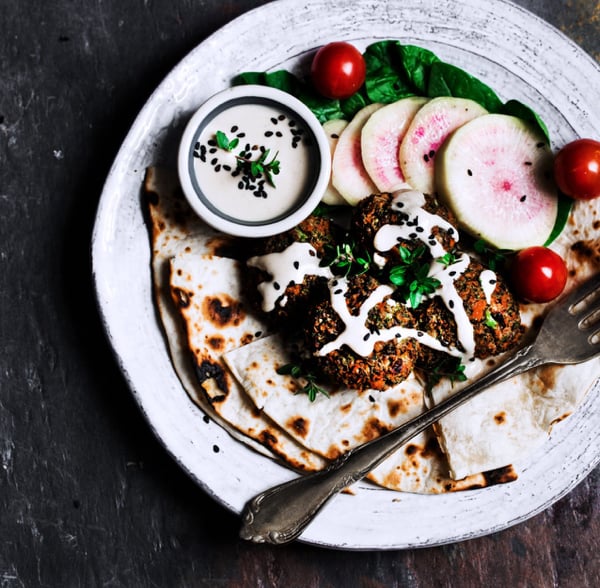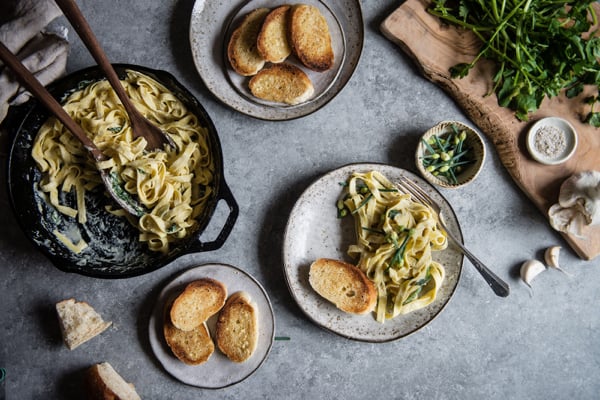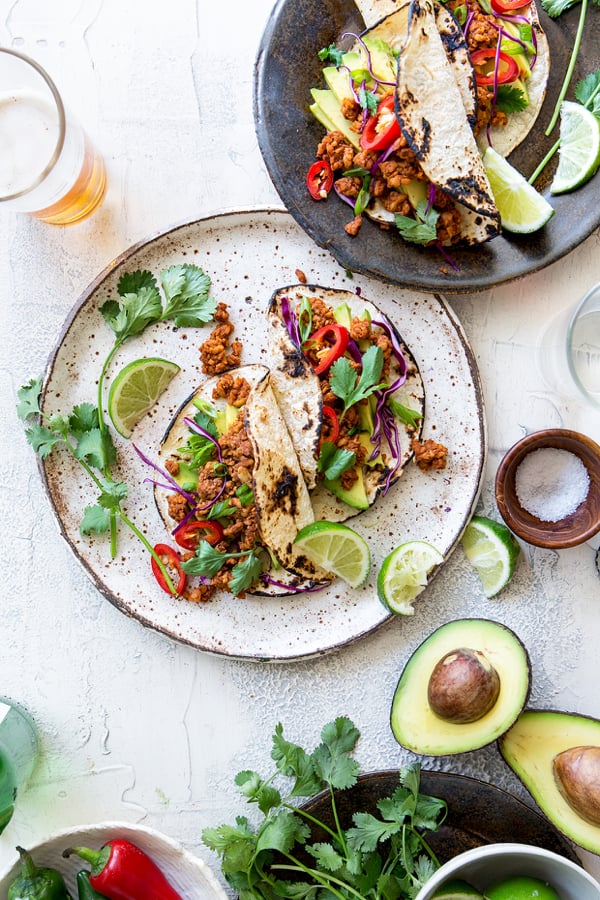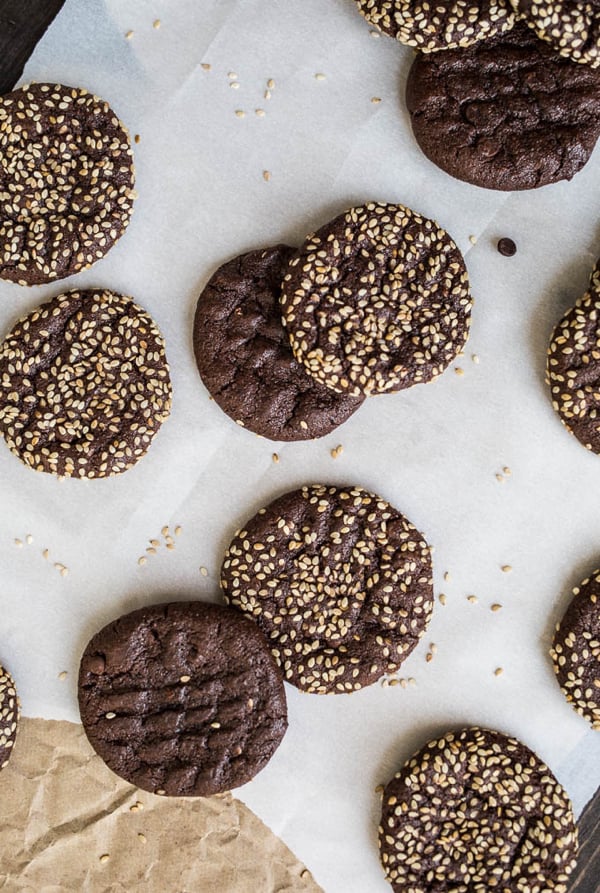Happy Sunday, everyone! It was a sparse blogging week, and it feels nice to be checking in. I hope you’ve all had an enjoyable weekend so far.
I’m now only one exam away from the end of my Advanced Nutrition II class, nearing the end of fieldwork for my community nutrition class, and in the final two weeks of a hefty freelance project. Things are busy, but the end of this stretch is most definitely in sight. As I make my way through it, I’m staying inspired with recipes and thought-provoking articles.
First up, I couldn’t be more impressed by Emmylou’s homemade spelt babka! It’s gorgeous, and Emmylou offers not one, but two flavorful filling options. I don’t know that my baking skills are up to snuff, but I’m tempted to try it when finals are behind me.
Maya’s baked veggie balls aren’t falafel, and they aren’t veggie burgers. They’re simple, versatile veggie and bean balls that you can serve with pita, pasta, a grain bowl, or a salad. I love this recipe, and I look forward to making it soon.
This chickpea alfredo with watercress and chives is a gorgeous springtime meal: hearty and creamy enough to feel like a treat, but still infused with fresh herbs and pungent watercress. It’s from Lindsey‘s inspiring new cookbook, Chickpea Flour Does It All, which I’ll be reviewing before too long, and right now the recipe is featured (along with exquisite photos) on Two Red Bowls.
I’m just drooling over these bold, flavorful tempeh tacos from Real Food by Dad. An easy recipe, and this is exactly the sort of meal I love to eat for a weekend breakfast!
Finally: I love chocolate, and I love tahini, so I’m pretty smitten with Tess’s chewy chocolate tahini cookies. What a great evening treat or snack!
Reads
1. I’m so happy that the role of narrative and storytelling is getting more and more attention in the medical world. Self-expression can play a critical role in the healing process, and no matter, what, clear communication between patients and their physicians is an important part of effective care.
We don’t usually think about narrative in the context of emergency medicine; it’s spoken of more frequently in cases of complex or chronic illness. But Dhruv Khullar has very compelling things to say about why even a few moments of conversation–what he calls “some moment of grace and meaning we can help patients find in the time they have left”–can help to make the ER a more humane space.
2. A great expose of how a recent study about genetics and vegetarian diets was manipulated and publicized misleadingly by a number of respectable media outlets. As I understand it, the study showed that some human beings living in primarily vegetarian cultures possess an allele that allows them to produce synthetic versions of omega-3 and omega-6 fatty acids. Such fatty acids may be lower in plant-based diets than in omnivorous ones, so this gene is a neat adaptive trick, evidence that human bodies can evolve to thrive nutritionally under different geographical and cultural circumstances.
The study authors suggested, however, that too many fatty acids in the body can be maladaptive and lead to inflammation, so people in vegetarian cultures who possess the allele may be best off avoiding excess meat or fatty foods in the diet (because in their case, the body is already predisposed to generate a sufficient amount of fatty acids without getting additional food sources).
Media spun this quite differently, making such claims as “long term vegetarian diet changes human DNA raising risk of cancer and heart disease,” “being a long term vegetarian changes your DNA and increases your risk of cancer” or even “being a vegetarian could kill you, science warns” (thanks, New York Post).
Kaleigh Rogers’ article points to the difficulties of credible science journalism. Most scientific studies are complex, and the findings are often significant only within a certain context. It’s the job of science writers to make the studies clear, but accessibility should never come at the expense of nuance. Oftentimes–as was the case with this study–the devil is in the details.
Rogers also interviews Nathaniel Comfort, a professor of astrobiology at the Library of Congress and NASA who blogs about hype and misconceptions in genetic research. He says,
“‘Vegetarians make us feel guilty, right? They’re so virtuous and ascetic, and yet bacon is so good, you know?…Interpreting this study like this is a way for someone to rationalize their not following a vegetarian diet.'”
I think this rationalization drives a lot of misconceptions and misleading information about veganism and vegetarianism in the media and popular science reporting, and it’s refreshing to see it called out.
3. A moving, beautiful essay about mating among pigeons and what it might suggest about the capacity of winged birds to experience the feeling we call love. Romantic love as we understand it is often thought to be a uniquely human emotion, and some dimensions of it may be, but as the author notes, many species demonstrate behaviors that are indicative of deep attachment and commitment to each other:
“Perhaps human love is unusually complex, invoking not just physiology but our unique cognitive sophistication. Still, many species display a cognitive complexity—awareness of self and others, long-term memory, a capacity for abstract concepts—comparable to primates. The gentle social courtship of “allopreening,” in which birds groom one another’s feathers, is especially sophisticated. Just as I can think fondly of my lover while she’s away, so might a pigeon think fondly of its absent mate.”
The article is wrapped around the author’s experience observing two pigeons in his Brooklyn neighborhood. One of the details I love most is that the research he conducted in response to the pigeon couple did not only change the way he thought about love in the animal kingdom; it also prompted him to think differently about pigeons as a species:
“Ubiquitous and unappreciated, typically ignored or regarded as dirty, annoying pests, pigeons mean something else to me now. Perched on building ledges, chasing scraps of food, taking to the skies at sunset: Each one is a reminder that love is all around us.”
I love reading about any breakthrough in how we regard and understand our animal neighbors, and this is such a beautiful articulation of admiration between species.
4. A really cool article about the placebo effect and its impact on autoimmune disease, via Mosaic. Essentially, the article addresses an intersection between conditioning, autoimmune modulation, and the placebo effect. Certain studies demonstrate that, if a body is given effective treatment in the form of medication in concert with a placebo, future administration of the placebo with a lower dose of medication may still induce healing.
It’s a nascent area of research (thanks to a combination of understandable skepticism and some amount of bias in the medical profession), but it offers the hope of decreasing medication costs and side effects.
When it comes to fasting, I’m admittedly a bit biased. My own experiences with fasting were all extensions of my eating disorder (whether I was in touch with my real motivations at the time or not), and because of my history I take a firm stance on the importance of regular, filling, sufficient meals.
I extend that stance to work with clients because I’ve yet to see any regular amount of meal-skipping or fasting that didn’t lead to binges, uncontrollable cravings, or overeating. In other words, I’d be a lot more openminded about the practice if I’d seen a track record of good results! Instead, I’ve seen it drive cycles of restriction and excess–a sentiment that is echoed by an ED specialist interviewed for the article:
“The research evidence generally shows that patients with eating disorders do best when they eat regular meals and snacks…Intermittent restriction of intake is often one of the behaviors that people with eating disorders engage in as part of their eating disorder — and it often sets them up to binge and/or purge.”
There is a body of scientific literature that links fasting to a slowing of the aging process, and there’s at least one plausible mechanism (increased activation of sirtuins) behind the findings. But what I love about the Vox article is that it makes clear that what works in a laboratory, or in the scientific abstract, doesn’t always work for human beings living in the real world, who are subject to complex psychology surrounding food.
The article actually made me realize that one symptom of my orthorexia was a tendency to treat my body as if it were a scientific experiment, subjecting it to food regimes that were impractical and devoid of pleasure for the sake of longevity or health. The desire to be healthful was good, but it became so obsessive that it started to override my sense of reason–and my capacity to recognize that eating is an act of pleasure and socialization and self-care in addition to being a part of healthy living.
I’m not saying that everyone who flirts with intermittent fasting is subject to the same motives or potentially destructive tendencies that I was. I carry around a lot of food baggage, and for me, a certain kind of caution is necessary–caution that may not be necessary for folks who are simply curious about a potentially beneficial way of eating.
But I do think there’s a certain danger in behaving as if nutrition can be divorced from real life experience, and in stripping the pleasure and cultural connotations of regular mealtime away from food. The author of this article, Julia Belluz, makes the point that the science of intermittent fasting is much less conclusive than some articles would have us believe. But her main point–the point I think is really compelling–is that the act of eating is not only about nutrient acquisition and metabolic regulation. It’s complex, and for better or for worse, it is deeply woven into the fabric of our whole lives.
On that note, friends, I’m off. I wish you a wonderful Sunday.
xo
You might also like
Some of you may have seen a story, which is now making the rounds, about the response that one employee got from her CEO when she let her coworkers know that she was taking a mental health day off. Software developer Madalyn Parker sent out an email to coworkers that read, “Hey team, I’m taking today and tomorrow to focus on my mental health. Hopefully I’ll be back next week refreshed and back to 100 [per cent].” Her CEO took the time to thank…
Happy Sunday. It has been a very hot, if beautiful and sunny weekend here in New York. I’ve gotten caught up on email and work, and now I’m back in the process of cooking, testing, and cooking some more. It’s not the most ideal time of the year to have the stove and/or the oven on, but the creative juices are flowing, and that’s what matters. Lots of interesting articles this week, as well as a few beautiful standout recipes from blogger friends. Recipes…
Oftentimes when I read about the importance of saying no and setting boundaries, the advice seems to assume that the things being declined aren’t all that desirable: unmanageable amounts of work, exhausting social commitments, and so on. This week, I learned how hard it is to turn down things that might be very enjoyable, but yet feel like too much. As soon as I was on the mend, I wanted so badly to connect with friends, get back to work, and feel more…
This week, two people who are close to me were waiting for news about their health. They both got the news they were hoping for, and a few days later, my oldest friend welcomed her second child into the world. Things happen all the time that make us stop and reconsider what we have. Sometimes the things we fear come to pass, and we find ways to move forward, to cope with them, to make peace with whatever realities they bring. Sometimes wonderful…







Leave a Comment
I read that fasting article a few weeks ago and I really liked how it approached the whole thing. I hate when things are over simplified and they broke down all the facts and explained everything. I don’t think I will be adopting a fasting diet anytime soon, but it is nice to have it properly explained without the hype.
I loved all the interesting insights and responses you gave on the articles like vegetarianism and fasting diets. I love the philosophy you have with food and I totally agree with you about the importance of health and nutrition.
Thanks for this great weekend reading round-up, Gena! Man oh man, does that Babka look like fun to try. I went to the how to shape it page too–seems like a perfect holiday project sometime. The chocolate sesame cookies caught my eye as well. They could also be made with carob. I loved the article about the pigeons especially. The fasting article and the way the vegetarian “gene” study got misinterpreted was really interesting. Have to be VERY sure about what gets passed on on facebook and elsewhere, and it’s not so easy to do! Good luck with your finals this week! xo